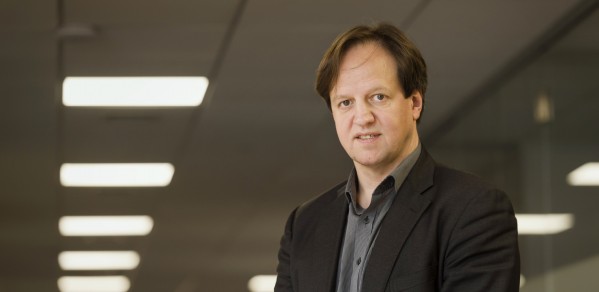
Professor Haas will be the Van Eck Professor of Engineering at the University of Cambridge from 1 April 2024.
Professor Haas has an outstanding academic record in pioneering the use of free-space light, set free from the confines of optical fibres, for high speed local data communications. He brings an exciting new area of research to the Electrical Engineering Division which complements a long history of world-leading research in photonics in Cambridge.
Professor Andrew Flewitt
Professor Haas pioneered 'LiFi' (Light Fidelity) the transmission of data through light modulation at potentially much higher data rates than is possible with WiFi or 5G. He coined the term LiFi during his talk at the TED Talk Global 2011 “Wireless Data from Every Light Bulb” during which he highlighted the technology that is able to transmit high definition videos at high-speed with only the use of overhead lighting. The talk has been watched more than 2.7 million times
LiFi was listed among the 50 best inventions in TIME Magazine 2011.
In 2015, Professor Haas presented another idea in which he used ordinary solar cells as LiFi receivers at the TED Talk Global 2015 "Meet the New LiFi Internet", which gained more than 2.9 million views.
He received his PhD degree from The University of Edinburgh in 2001. He is a Distinguished Professor of Mobile Communications at the University of Strathclyde.
He is the initiator, co-founder and Chief Scientific Officer of pureLiFi Ltd as well as the Director of the LiFi Research and Development Centre.
His most recent research interests are in combining physics, communication theory and artificial intelligence to develop new wireless technologies and systems for secure, high-speed and net-zero communication networks.
He co-authored three books entitled: “Next Generation Mobile Access Technologies: Implementing TDD’, and “Principles of LED Light Communications Towards Networked Li-Fi” both published with Cambridge University Press in 2008 and 2015 respectively, as well as “An Introduction to Optical Wireless Mobile Communications” published with Artech House in 2021.
He leads one of three new Telecoms Hubs on ‘Network of Networks’ in the UK, TITAN, which is a consortium of 16 universities and four UK research institutions.
He has co-authored more than 650 conference and journal papers with more than 50,000 citations and holds 45 patents and has been listed as highly cited researcher by Clarivate/Web of Science since 2017.
Professor Haas was awarded a Royal Society Wolfson Research Merit Award in 2017. In 2019 he received the IEEE Vehicular Society James Evans Avant Garde Award and the Enginuity Connect Places Innovation Award in 2021. He was the recipient of a Humboldt Research Award for his research achievements to date in 2022. He was shortlisted for the European Patent Office Inventor Award in 2023.
In 2016, he was the recipient of the Outstanding Achievement Award from the International Solid State Lighting Alliance.
He is a Fellow of the IEEE, a Fellow of the Royal Academy of Engineering (RAEng), a Fellow of the Royal Society of Edinburgh (RSE) and a Fellow of the Institution of Engineering and Technology (IET).
Professor Haas was interviewed by Jim Al-Khalili on BBC Radio 4 'The Life Scientific' in 2023
The Van Eck chair in Engineering
The Van Eck chair in Engineering was created thanks to a legacy from Mr Fred van Eck. The chair sits within the field of advanced science and technology, with an emphasis on high-speed communications. It was previously held by Professor Ian White until he left to become Vice-Chancellor of the University of Bath.
The Electrical Engineering Division
Professor Haas will be based in the Electrical Engineering Division. The study of high-speed communications is a thriving research area in the Department of Engineering. The Electrical Engineering Division has world-leading research on the hardware that underpins photonic systems and communications networks. The Information Engineering Division has similarly distinguished research on coding, compression and information theory for communications systems.

